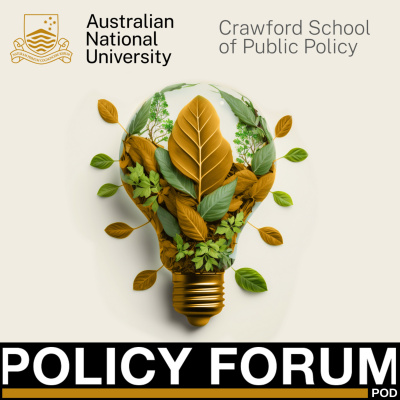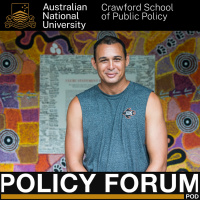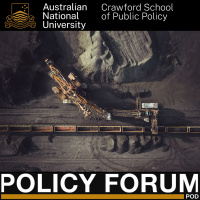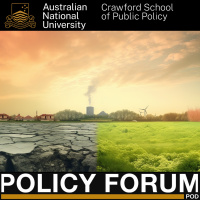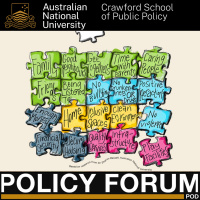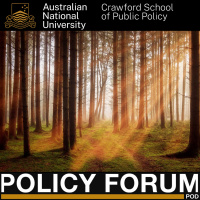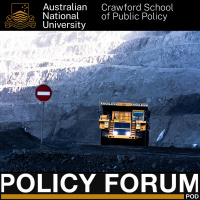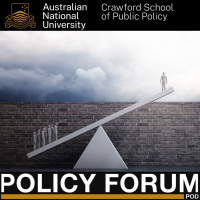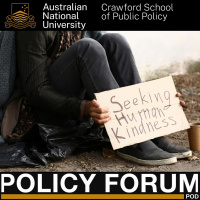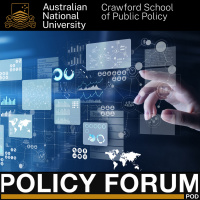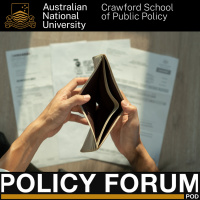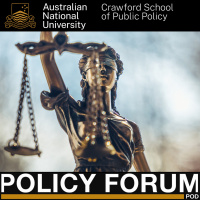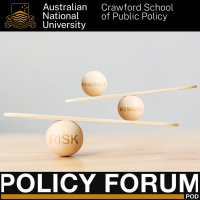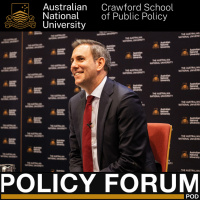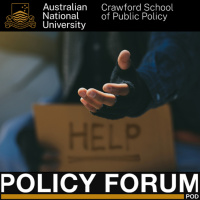Sinopsis
Policy Forum Pod is the podcast of Policy Forum.net - Asia and the Pacific's platform for public policy debate, analysis and discussion. Policy Forum is based at Crawford School of Public Policy at the Australian National University.
Episodios
-
Thomas Mayo on the Voice to Parliament
27/09/2023 Duración: 40minIn this special episode of Policy Forum Pod, Thomas Mayo joins Sharon Bessell and Arnagretta Hunter to discuss the importance of the Voice to Parliament.Thomas Mayo explains how the Voice will create unity and a stronger future. We are a Nation divided, but Constitutional recognition of Aboriginal and Torres Strait Islander peoples gives us a way of coming together and leaving a legacy of collective hope and justice for our children.---Thomas Mayo is a Kaurareg Aboriginal and Kalkalgal, Erubamle Torres Strait Islander man. He is the Assistant National Secretary of the Maritime Union of Australia. Thomas is a signatory of the Uluru Statement from the Heart and has been a leading advocate since its inception in May 2017. He is the author of six books, including the very beautiful Finding the Heart of the Nation and The Voice to Parliament Handbook, co-authored with Kerry O’Brien.Sharon Bessell is a Professor of Public Policy and Director of both the Children’s Policy Centre and the Poverty and Inequality R
-
Health impacts of fossil fuels
22/09/2023 Duración: 52minThis podcast delves into the complex world of balancing the need for energy through fossil fuels and protecting the environment and human health. Energy is central to so much human activity today and the politics are complex, weighing up local and global needs for energy, the ‘needs of the economy’ against the resultant environmental and climate impacts. Guests Professor Melissa Haswell and Professor Hillary Bambrick discuss how in the centre of this balance is human health and wellbeing which is dependent on energy, but adversely impacted by fossil fuel extraction, processing and by climate change.Oil and gas extraction impacts the environment through pollution and habitat destruction from which recovery and restoration is complex. These industries often operate on Indigenous lands, leading to harmful land rights conflicts. The fossil fuel industry is also a major driver of greenhouse gas emissions and resultant climate change.We need to be good ancestors and we need to put people first, put health fir
-
Insights into the Intergenerational Report
15/09/2023 Duración: 54minThis Podcast delves into the Intergenerational Report, looking at both the challenges and opportunities it highlights.Dr Liz Allen and Professor Paul Burke discuss the key takeaways of the latest IGR that in 2062 Australia will be bigger, slower growing, and more diverse, with living standards at risk of going backwards.Liz says we are “heading into the greatest demographic headwinds of our time,” and we need to spend more time imagining the whole picture, with a particular focus on inequality. We must “discuss the need for earnest and substantive change to actually take control and not assume demographic destiny,” she says.Professor Paul Burke highlights there are a lot of assumptions in the report and discusses our need for specific reforms particularly around superannuation and stamp duty, with additional information also needed in subsequent intergenerational reports. ---Dr Liz Allen is a demographer at the ANU Centre for Social Research and Methods, and has deep experience across the public and uni
-
Power and policy: from despair to action
08/09/2023 Duración: 55minThis episode discusses the connections between planetary health and human health. Sharon Friel and Fran Baun look at the challenges of health inequality, over-consumption and how we move toward a better future. To have healthy people we need to have a healthy planet, and in order to do that we need to be prioritising the health and wellbeing lens as a powerful tool for policy shifts. "It can't be biomedical, it's about social. It can't be economic, it's about social. It can't be colonisation, it's about social," Sharon Friel says.---Professor Sharon Friel is the Director of the Planetary Health Equity Hothouse, and the Australian Research Centre for Health Equity at the School of Regulation and Global Governance (RegNet), here at the Australian National University. She is also the Director of the Menzies Centre for Health Governance. Professor Fran Baum, AO, is a public health social scientist, and a professor of health equity at the Stretton Institute, at the University of Adelaide. She has a
-
Creating communities for children
01/09/2023 Duración: 53minThis National Child Protection Week we ask the question: What part can we as individuals play in protecting children and creating a culture of care?The theme for this year’s National Child Protection Week is ‘Where we start matters’ building on the essence that ‘every child in every community needs a fair go’. In this episode, we speak to researcher Tim Moore, and NAPCAN Deputy-CEO Rani Kumar about what needs to happen, not just this week, but every day of the year. They discuss the structural problems that need to be addressed in the policy sphere to protect all children, including poverty. Stressors need to be taken off families to help prevent abuse and neglect. Rani Kumar says we need to reframe the conversation to remove shame from parents who are seeking support. The questions being asked need to change from focusing on the parents, and society as a whole. For instance, why is society not providing families the support and safety nets and why as a community do we think it is okay for a child to live in
-
Reclaiming imagination with Rob Hopkins
25/08/2023 Duración: 56minIn this episode, Rob Hopkins discusses why we need imagination as a core component to create the future we want. We need to make time to listen to the bird song and allow our minds time to come up with solutions to tough problems. “At a time when we fundamentally have to reimagine everything, we’ve created the worst possible conditions for the human imagination,” Hopkins said. Without imagination and big-picture thinking, we are unable to create a longing for our future that will spark hard work to get there. Rob Hopkins, the founder of the Transition Network, says we need to break down the silos of policy and understand how interconnected we all are. If we are to make a better future and protect the world from climate change, we need to have regional government, local government and communities working together.Most of all, we need to ask ‘What if?’ ---Rob Hopkins is a cofounder of Transition Town Totnes and Transition Network. He has authored a number of books, including From What Is to What If: unleashing
-
Towards Net Zero: climate, policy and politics
18/08/2023 Duración: 51minIn this episode, Dr Rebecca Colvin talks about Australia’s new Net Zero Authority, and the challenges some regional communities are facing as we move towards a decarbonised future. She expands on the role of both local and political leadership, and how identity influences the way in which our politics work. People’s love for and connection to place is often overlooked or outright ignored, as is local knowledge. Place-based community approaches are an integral part of climate adaptation.Hosts Sharon and Arnagretta also discuss Bec’s latest work ‘Contextualizing coal communities for Australia’s new Net Zero Authority’ and discuss how an attack on coal is often felt as an attack on coal workers and communities. They talk about how in order to create common ground and progress, clear and specific communication is important.---Dr Rebecca Colvin is a researcher and senior lecturer here at the Crawford School at ANU. She researches the social and political dimensions of contentious issues associated with climate pol
-
Politics of despair: 21st century capitalism
11/08/2023 Duración: 51minIn this episode, Professor Susan Sell talks about 21st century capitalism and how it undermines health outcomes, social goals and equity. She discusses the connection between the market, our work and our health, particularly for those with precarious working conditions where we see the market’s direct impact on physical and mental wellbeing. Professor Sell explains the phenomenon of ‘failure demand,’ growing demand for services we shouldn’t need, particularly if we were to value caring for people and place in society. A key concern raised by Professor Sell is corporate tax avoidance and profiteering. She highlights how clear this has become, giving examples from the COVID-19 pandemic when major corporations gained record profits from government stimulus in the economy. Companies now focus on making more money for shareholders rather than the betterment of society. ----Professor Susan Sell is based at the School of Regulation and Global Governance (RegNet) at the Australian National University. She has previou
-
What we value: reimagining social policy
04/08/2023 Duración: 48minThis week, Professor Kay Cook and Associate Professor Ben Phillips talk about reimagining what we value and how we value it when it comes to poverty and social policy in Australia.Both Professor Cook and Associate Professor Phillips are on the Economic Inclusion Advisory Committee and advocate strongly for raising the rate of support payments in Australia, to bring people out of poverty.Phillips takes us through the immediate steps and payments that would make a difference to poverty in Australia, and how to raise the revenue to make it happen. He says by lifting JobSeeker to 90% of the aged care pension would bring around one million people above the poverty line. For the millions of people still below the poverty line, it alleviates the depth of poverty they suffer. Cook reminds us that people who are receiving JobSeeker payments are being forced to choose between food and medicine, and in colder climates, also warmth. Cook puts in perspective through her own research, how having limited government sup
-
Hierarchies of evidence: reimagining social policy
28/07/2023 Duración: 46minIn this episode, Dr Andrew Leigh MP sits down in the studio with Sharon and Arnagretta to discuss the hierarchies of evidence in policy making in Australia. Dr Leigh, a former Economics Professor at the ANU and prolific author on the subject, shares his views on the benefits of randomised trials and what he hopes the newly established Australian Centre for Evaluation will accomplish in a data-rich world. Understanding the strengths and limitations of each data collection method is crucial. This can include awareness of the knowledge framework that underpins the design of a trial, the structure of the data that’s being collected and the subsequent analysis. Dr Leigh emphasizes the need for better evidence and an evidence-based strategy to improve support and public policies for Australians as we work towards a wellbeing economy. Dr Andrew Leigh is Assistant Minister for Competition, Charities, Treasury and Employment, and Federal Member for Fenner in the ACT. He holds a PhD in Public Policy f
-
After Robodebt: reimagining social policy
21/07/2023 Duración: 57minProfessor Peter Whiteford joins us to talk about the highly anticipated Robodebt Scheme Royal Commission report. He breaks down some key items of the report, and how he thinks we can prevent a policy like this from happening again. It is clear that the scheme was made possible through years of attitude and policy changes that prevented access to social security and stigmatised those who received it. Professor Whiteford also highlights that when Robodebt was active there was an ongoing pattern of deception to prevent results from the Administrative Appeals Tribunal (AAT) being released to the public.He recalls the disbelief he felt when he learned that DHS was averaging out income over a whole year. While Robodebt affected a vulnerable minority of the population, this government failure represents a risk to all Australians. “You are very lucky if you don’t have to call on social security at some time in your working life.” Peter Whiteford is a Professor at the Crawford School of Public Policy. He’s
-
Valuing care: reimagining social policy
14/07/2023 Duración: 47minThis episode kicks off our miniseries on reimagining social policy. Sharon Bessell sits on the other side of the mic to give her insights into how Australia ended up in the position it is, the commodification of public policy and how child poverty became acceptable in society. She talks about the policy history that allowed Robodebt to be accepted, the current PwC scandal, and how this is all a part of a bigger picture of Australia’s step backwards in helping those in need. Sharon also gives us hope that we’re now seeing a shift away from this style of policy, towards a wellbeing and care economy. If done right, she says, it’s a once in a generation chance to make a difference, especially to the lives of children. Sharon Bessell is a Professor of Public Policy and Director of both the Children’s Policy Centre and the Poverty and Inequality Research Centre at ANU Crawford School of Public Policy. Arnagretta Hunter is the Human Futures Fellow at ANU College of Health and Medicine, a cardiologist, physicia
-
Constitutional reform: recalibrating Australia’s voice
07/07/2023 Duración: 48minIn this episode we talk to Professor Kim Rubenstein about what Constitutional change means for Australia and how the Voice to Parliament is the first step in recalibrating for modern times. She discusses how the Australian Constitution is structurally caught in the 1890s and we need to evolve our constitution so it represents who we are today.Professor Rubenstein also criticises the unreasonable expectation that the Voice should have unanimous support in Indigenous communities. She points out that there is never 100 per cent agreement from the population on any issue and that there is a wide consensus on the Voice among First Nations people.Kim Rubenstein is an Australian legal scholar and lawyer, and ran for the Australian senate in the most recent federal election. She’s a Professor of Law at the University of Canberra. In 2020 she became the inaugural Co-Director, Academic of the 50/50 by 2030 Foundation. Previously she was a Professor of Law at the Australian National University. Sharon Bessell is a Profe
-
The challenges and heartbreak of climate negotiations
30/06/2023 Duración: 49minOn this episode, we discuss the deliberations, points of contention and wider implications of the Bonn Climate Change Conference, which recently took place in Germany. Dr Siobhan McDonnell who was part of the negotiations joins us for this podcast.The Bonn Climate Change Conference aims to lay the groundwork for the political decisions required at the UN Climate Change Conference (COP28) at the end of the year.Dr McDonnell describes the “real and palpable grief in the room” when new climate science was presented to the Alliance of Small Island States that showed predictions are now twice as bad in 2100 compared to what was presented in the latest IPCC report.Despite this new data, a backwards step has been taken in the difficult negotiations. There’s now no longer an agreement on including the IPCC report as an agenda item at COP28. She says that the latest climate science is horrific and apocalyptic and the fact that negotiations cannot “even begin from that established understanding is very hard.” She also
-
Catch up on the Voice to Parliament
23/06/2023 Duración: 03minPolicy Forum Pod encourages you to take this week to listen back to some of our episodes around the Voice to Parliament. Professor Kate Auty spoke to Sharon Bessell and Arnagretta Hunter about her work on documenting Australia’s true history and her work in establishing indigenous courts. Dale Agius, South Australia’s inaugural Commissioner for First Nations Voice discussed how SA’s Voice to Parliament can be used as a template to understand the need for our national referendum. MP Dr Helen Haines gave her insight into how people in regional Australia are reacting to the Voice Referendum and the types of conversations she is having about constitutional change. Film and TV director Rachel Perkins talked about her dedication to telling indigenous stories and how Australia’s voice can give First Nations Peoples a voice. And you can listen to Catherine Liddle, the CEO of SNAICC, discuss the lasting impact policy has on Indigenous peoples. You can fi
-
Integrating risk, reward and resilience in policy
16/06/2023 Duración: 52minIn this episode, we delve into the new Risk, Reward, and Resilience Framework with Professor Anthea Roberts and Dr Arnagretta Hunter. The pair, along with host Sharon Bessell discuss how this framework can be applied across multiple disciplines from health to climate change to work through complex policy challenges.Its goal is to break down the silos of thinking, and enable insights from diverse disciplines to not just be ‘bolted on’ to ideas, but be included right from the beginning. Anthea Roberts encourages experts to learn to speak ‘policy pidgin’ and communicate in an interdisciplinary dialogue, while still maintaining their specialty knowledge and perspective.The discomfort of ideas, rather than just agreement, is beneficial under this framework. Arnagretta Hunter also raises how uncertainty should be incorporated into best practice, not just in health care settings, but across a broad range of policy spheres.Implementing the framework will require changing how we listen to create a space that will info
-
Policy without voice: a history of failure and harm
09/06/2023 Duración: 59minCatherine Liddle, the CEO of SNAICC the National Voice for Aboriginal and Torres Strait Islander Children, joins us for a powerful conversation about the lasting trauma of policy failures.She tells the incredible story of her family meeting Thomas Mayor and discussing the Uluru Statement from the Heart that he rolled out on the floor of her lounge room. “We could hear the beating of that heartbeat,” she said.Catherine also shares her insight on how poverty in indigenous communities is often misunderstood as neglect, the damage of covert racism, and why Alice Springs often becomes a political football. “Everything relates to policy, and we know that the wins are only as good as the government that gets them across the line.”Catherine Liddle is an Arrernte/Luritja woman from Central Australia. She’s a leading advocate in upholding the rights of Aboriginal and Torres Strait Islander people. As CEO of SNAICC – the national voice for Aboriginal and Torres Strait Islander children, she works to strengthe
-
Budget beyond the numbers with Treasurer Dr Jim Chalmers
02/06/2023 Duración: 01h22minIn this special episode of Policy Forum Pod, we are joined by the Treasurer, the Hon Dr Jim Chalmers MP, who talks about the values behind the May budget.The Pod was recorded live in front of an audience at the ANU Crawford School of Public Policy on May 31st, 2023. The Treasurer gave a short speech highlighting the nine ways to unlock the budget before sitting down for a one-on-one conversation with Crawford School Director Professor Janine O’Flynn.Following this, an ANU panel of experts from the Crawford School of Public Policy answered questions about the longer-term impacts of the budget.Panel members were:Sharon Bessell, a Professor of Public Policy and Director of both the Children’s Policy Centre and the Poverty and Inequality Research Centre at ANU Crawford School of Public Policy. She is also the co-host of the Policy Forum Podcast. Frank Jotzo, a Professor of environmental economics at Crawford School and Head of Energy at the ANU Institute for Climate, Energy and Disaster Solutions. He’s been
-
Behind the scenes of change
26/05/2023 Duración: 42minIn this episode, we speak to Rachel Perkins, a film and television director, on her dedication to telling indigenous stories and the Voice to Parliament. WARNING: Aboriginal and Torres Strait Islander listeners are warned that the following podcast contains stories about deceased persons.Released at the start of Reconciliation Week 2023, Sharon Bessell and Arnagretta Hunter acknowledge the 6th anniversary of the Uluru Statement from the Heart and discuss with Rachel how those fighting for change are trying to make it happen.“We put our trust in the Australian people and hopes in the Australian people because we have had our trust and hopes shattered so many times by the government,” she says.Rachel also talks about the legacy of her work and that of her father, Charles ‘Charlie’ Perkins. As a civil rights activist, he led the University of Sydney students on a ‘Freedom Ride’, which played an important role in shaping the 1967 referendum, but also the conversation around our current Voice to Parliament referen
-
The economy and our future
18/05/2023 Duración: 52minBudgets are a central tool of government, offering not just economic policy but defining social and environmental policies for the years ahead. The 2023 budget moves in “the direction of fairness,” but is it moving fast enough? In this episode, we speak to Professor Paul Burke and Associate Professor Elise Klein about the impact budget priorities have on people’s daily lives, the values that underlie it, and unpacking the choices that have been made. Discussion centred on the care economy, the level of welfare payments and the revenue needed to support our most vulnerable. Associate Professor Elise Klein says the government was in a position to do something bold after voters asked for action on poverty, inequality, and climate action. A government “going from terrible to being less terrible is still terrible,” she says, adding that a lot of people are being left behind in life-and-death situations because of the decisions of this Government in this budget. In order to have more money to spend t
